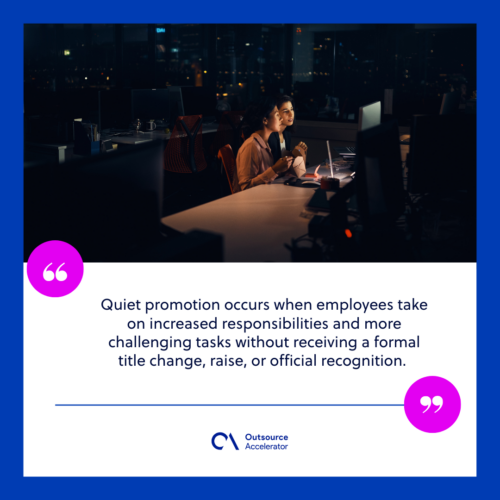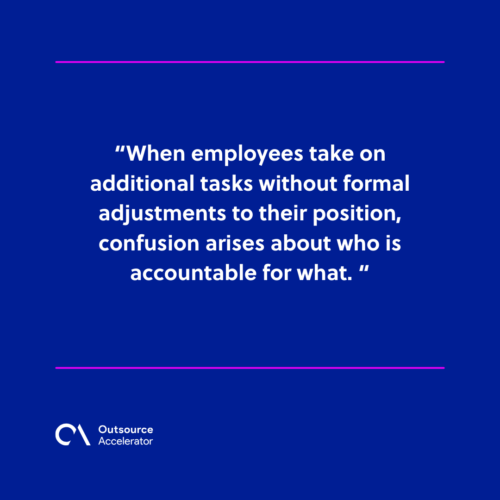Quiet promotion: A subtle threat to employee engagement and loyalty

Employees often dream of climbing the career ladder, seeking new roles, increased responsibilities, and recognition for their efforts.
Imagine a dedicated worker who takes on more complex projects and unofficial leadership duties but receives neither a formal promotion nor a raise. Instead, their added responsibilities often go unnoticed, except for occasional mentions in meetings.
This situation, known as quiet promotion, can quietly erode motivation and trust.
In this article, we’ll explore how quiet promotion affects employee engagement and loyalty, revealing why businesses should pay close attention to this subtle but impactful issue.
What is quiet promotion?
Quiet promotion occurs when employees take on increased responsibilities and more challenging tasks without receiving a formal title change, raise, or official recognition.
Instead of an announced advancement, their role expands silently, often without clear communication or acknowledgment from management. This can happen when organizations rely on informal adjustments to job duties rather than formal promotions.
Employees may find themselves leading projects or managing teams while remaining in their original positions on paper.
Quiet promotion can create confusion about career progression and leave workers feeling undervalued. It contrasts with traditional promotion practices that celebrate milestones and reward employees transparently.
Understanding quiet promotion helps businesses address hidden challenges related to employee motivation and retention.

Significant impact of quiet promotion to employees
Many employees believe that taking on more responsibility naturally leads to recognition and growth. When this expectation goes unmet, it can cause serious consequences.
Quiet promotion, where added duties come without formal acknowledgment, affects workers in several important ways:
Decreased motivation and engagement
When employees handle new tasks without title changes or pay increases, their motivation can quickly decline. They may feel their extra effort goes unnoticed or undervalued.
This feeling of being taken advantage of often results in lower engagement. Consequently, workers become less invested in their roles and stop going the extra mile.
Increased stress and burnout
Quiet promotion typically means more work without additional resources or support. Employees can struggle to balance growing demands with existing responsibilities, leading to stress and exhaustion.
Over time, this imbalance contributes to burnout, reducing overall productivity and job satisfaction.
Career uncertainty and frustration
Employees expect clear career paths and progression. When promotion happens quietly, it creates confusion about their standing and future opportunities.
Uncertainty can generate frustration and erode trust in leadership. Workers may begin to question whether their efforts will ever lead to meaningful advancement.
Quiet promotion carries hidden risks for employee well-being and long-term commitment.
How quiet promotion can harm organizations
Many businesses believe that quietly expanding employee roles saves time and resources compared to formal promotions. However, this approach can backfire, causing significant harm to the organization’s culture and performance.
Quiet promotion creates hidden problems that affect employee morale, retention, and overall productivity:
Blurred role clarity and accountability
Quiet promotion often leads to unclear job roles and responsibilities. When employees take on additional tasks without formal adjustments to their position, confusion arises about who is accountable for what.
Lack of clarity can lead to overlaps, missed deadlines, and inefficiencies, ultimately slowing team performance and decision-making.

Increased turnover rates
Talented employees often leave companies that fail to acknowledge their growth properly. Quiet promotion can cause frustration and feelings of being overlooked, prompting staff to seek opportunities elsewhere.
High turnover costs organizations time and money in recruitment and training, while disrupting workflow and team dynamics.
Damaged trust in leadership
Quiet promotion can erode trust between employees and management. When workers perceive that promotions happen secretly or unfairly, skepticism grows. This distrust harms communication and collaboration, weakening the company’s ability to execute strategies effectively.
Stalled organizational growth
Without transparent career development, employees lose motivation to develop new skills or take initiative. As a result, organizations miss out on innovative ideas and leadership potential. Quiet promotion creates an environment where progress looks promising but ultimately stalls, limiting long-term success.
Companies that overlook the dangers of quiet promotion risk harming their workforce and weakening their competitive edge. Recognizing and addressing this issue helps build stronger, more motivated teams ready to drive business growth.
5 ways to prevent quiet promotion
Preventing this practice helps maintain transparency and trust in the workplace. Organizations can adopt several strategies to make promotions visible and fair:
1. Establish clear promotion criteria
Organizations must define transparent criteria for promotions. Employees should understand the specific skills, achievements, and behaviors that lead to advancement.
Sharing these benchmarks openly removes ambiguity and creates a standard that everyone can follow.
2. Communicate promotion decisions publicly
Announcing promotions through formal channels, such as team meetings or company newsletters, highlights recognition. Public communication celebrates accomplishments and reduces feelings of favoritism or secrecy among staff members.
3. Involve managers in open discussions
Managers play a critical role in discussing career paths with their teams. Regular one-on-one meetings provide opportunities to talk about performance and growth opportunities. This approach builds trust and clarifies the promotion process for all employees.
4. Document promotion processes
A well-documented promotion procedure acts as a reference for everyone involved. Written guidelines help HR and management apply consistent standards, preventing accidental quiet promotions and reinforcing fairness.
5. Encourage employee feedback
Collecting input from employees about promotion practices allows organizations to identify gaps and improve transparency. Feedback channels such as surveys or suggestion boxes promote a culture of openness and respect.
Promoting transparency in advancement builds a stronger workplace culture. By adopting clear standards, communicating openly, involving managers, documenting processes, and welcoming feedback, organizations can effectively prevent quiet promotion.
This approach nurtures fairness and motivates employees to grow confidently within the company.
Quiet promotion: Important FAQs
Let’s answer some of the frequently asked questions about ghost growth:
How is quiet promotion different from healthy skill development?
Quiet promotion adds responsibilities without recognition or rewards. Healthy skill development includes clear expectations, support, and acknowledgment, ensuring employees feel valued as they grow.
Can quiet promotion happen unintentionally?
Yes. Quiet promotion often occurs when workloads shift quickly and managers fail to update roles formally. Without intentional oversight, added duties accumulate and go unrecognized, creating unfair imbalances.
Are certain job roles more vulnerable to quiet promotion?
Roles with flexible duties, such as project management or administrative work, are more at risk. These positions often absorb extra tasks easily, making it harder to track when responsibilities quietly increase.
How can employees address quiet promotion with their managers?
Employees can schedule a meeting, present examples of expanded duties, and request clarity on expectations. Framing the discussion around career growth helps managers understand the need for formal recognition.
Does remote work increase the likelihood of quiet promotion?
Remote work can make quiet promotion more common, as added tasks are less visible and role boundaries become blurred. Without clear communication, employees may assume more responsibility without formal recognition.







 Independent
Independent




